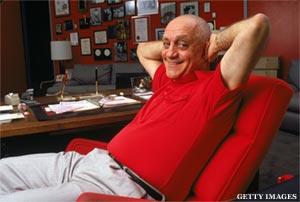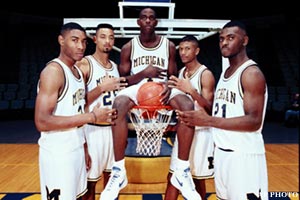On the eve of this season’s NCAA tournament, the premiere of two documentaries -- HBO's "Runnin’ Rebels of UNLV" and ESPN’s "Fab Five" -- remind us why college basketball is so special, and why these two programs were so memorable.
Both UNLV and Michigan brought a new dynamic to the sport and did so in controversial fashion. Under coach Jerry Tarkanian, UNLV basketball became part of the glitzy entertainment landscape of Las Vegas and lived up its Runnin' Rebels nickname. Michigan stirred it up by going to an all-freshmen starting lineup and expanded its influence with its style. Thanks to the Fab Five, black socks, black shoes, baggy shorts and shaved heads became a phenomenon across the nation.
Here's a look at how the networks handled the productions:
NCAA Allegations
Runnin' Rebels: HBO did a superb job showing both the successes of Tarkanian mixed in with the scandals. It made sure to get both sides Tarkanian’s run-ins with the NCAA, showing his points of view, as well as that of the NCAA.

Just before the 1976-77 season in which UNLV reached the Final Four, the NCAA advised the school to suspend Tarkainian two seasons for recruiting infractions at both Long Beach State and Vegas. Tarkainian sued the NCAA, prompting an 11-year case that Tarkanian won in the Supreme Court. Along the way, Tarkanian avoided suspension, but UNLV was put on probation and kept off national television for an extended period.
In another incident, a photo surfaced after UNLV’s 1991 loss to Duke of UNLV players in a hot tub with Rich "The Fixer" Perry, a famous Las Vegas bookie and under-the-radar UNLV recruiter. The NCAA advised UNLV to fire Tarkanian, prompting his resignation after coaching one final season. Tarkanian rescinded his resignation and fought UNLV President Robert Maxson for his job, but in the end, Tarkanian was forced to leave the university after 1992. Anthony notes that it was "not [their] finest hour."
In 1998, the NCAA paid Tarkanian $2.5 million in an out-of-court settlement after he sued for harassment.
Fab Five: The Fab Five’s legal battle did not come through the coach, but rather through the actual players. Michigan was forced to vacate its 1992 and 1993 runner-up finishes because of improper benefits taken by Detroit natives Webber and Rose from "Big Money" Ed Martin, a Ford electrician known for helping local basketball players get some extra cash. Before a grand jury, Rose claimed that Martin had given him some extra pocket change while at Michigan, while Webber denied accepting money from Martin. Eventually, Webber was revealed to have accepted $280,000 from Martin, essentially forcing Michigan in 2002 to take down its own Final Four banners.
ESPN does a good job interviewing a variety of people to get their view on the Webber issue. Rose claims that Webber was throwing Martin under the bus, while Mitch Albom insists that Webber must have gotten the money after his tenure at Michigan, considering that Webber did not live a flashy college lifestyle. Michigan officials also pop up on the screen, claiming that they would forgive Webber after a simple public apology.
Webber, it must be noted, declined to participate in the documentary.
Objectivity
Runnin' Rebels: The "Runnin’ Rebels" documentary has a hard time dealing with objectivity due to the massive support that Tarkanian has received the past few decades. HBO manages to find a select few NCAA officials and angry journalists who were not as gung-ho over Tarkanian’s energy during his tenure at UNLV, and the network tries its best to be balanced.
Fab Five: As mentioned earlier, ESPN does a good job presenting both sides of a story. This is made essentially easy when players like Rose take a stance against one of their fellow teammates. Also, when no opposition interviewee can be found, the narrator touches upon what the other side of an issue might have been thinking. For example, the narrator mentions how a five-freshmen starting line-up might have rankled Michigan's upperclassmen, many of whom did not participate in the documentary.
Celebrity interviews
Runnin' Rebels: UNLV has never been a school rich in celebrity support, but HBO executes in using its one household name: Jimmy Kimmel. Kimmel, who grew up in Las Vegas and spent one year at UNLV, discusses his point of view as a die-hard Rebel fan. Kimmel touches on the unity that UNLV basketball brought to the community and the fun of attending a game at the Thomas & Mack Center. He is also important as a form of comic relief during particular periods of seriousness.

Fab Five: If we leave Mitch Albom out of this category, the two main celebrities are rappers Ice Cube and Chuck D. The two artists, who are similar in age to the Fab Five, talk about the influence of the players on African American culture during the time period. But it is unclear as to why ESPN chose to interview Los Angeles and New York-based rappers, rather than any from Detroit.
What We Learned
Runnin' Rebels: Frank Sinatra, a UNLV fan, was used by Tarkanian as a recruiter. Sinatra proved to be a liability on the recruiting end, apparently better with song lyrics than persuasion. Former recruit Jim Graziano claimed that when Sinatra called his home and identified himself, Graziano’s mother replied by saying, "I’m Ella Fitzgerald," and hung up. Graziano subsequently attended South Carolina.
* Ten different UNLV players were suspended at different time periods during the 1989-90 championship season.
* Tupac Shakur sported a UNLV T-shirt in an early 1990s music video.
* Greg Anthony practiced in a hockey helmet after cracking his jaw in a 1990 game.
* Jimmy Kimmel and his friends once drove Tarkanian’s wife to her hotel while on a trip to watch UNLV in Los Angeles.
* Greg Anthony was the vice chairman of the Young Republicans Club at UNLV.
Fab Five: In Atlanta during the 1992 NCAA tournament, Muhammed Ali let the Fab Five enter his hotel room.
* While in Milan's Piazza Square in 1992, the Fab Five played themselves off as an up-and-coming rap group.
* Jalen Rose's biological father was Jimmy Walker, the No. 1 overall pick in the 1967 draft. Walker abandoned his family, but Rose still wore No. 42 in high school, the reverse of King’s NBA number, 24.
* Ray Jackson could easily be mistaken for Randy Jackson.
* When Webber looked over at the bench while dribbling up the court at the end of the '93 championship, a member of the Michigan bench is clearly seen calling for a time out. As Webber dribbles near the bench, it seems that other players were urging Webber to call a timeout. Webber never hesitates in telling coach Steve Fisher that he was sure that someone on the bench was calling for a timeout.
* Webber was once trying to court Albom into giving him gas money when the two men passed a store selling Michigan No. 4 jerseys for $75.
The Bottom Line
Both documentaries are content-rich accounts of two of the most intriguing programs in college basketball history. Both HBO Sports and ESPN, the two top sports journalism production teams in the world, do a fine job in supplying as much information as possible in a limited period of time. Both are much-sees for any avid college basketball fan, especially those who were not around during the respective time periods.
Lines of the night
"It’s more important to educate than to graduate."
– Jerry Tarkanian, explaining why he pulled kids out of criminal and impoverished lives when he knew that they would likely not have the grades to graduate. Tarkanian felt that by at least introducing young adults living hard lives to the aspect of a team and responsibility, he could help them grow.
"I hated Christian Laettner."
– Jalen Rose, discussing the days before Michigan’s first game of the 1991-92 season against Duke. It was one of his many anti-Duke lines.




